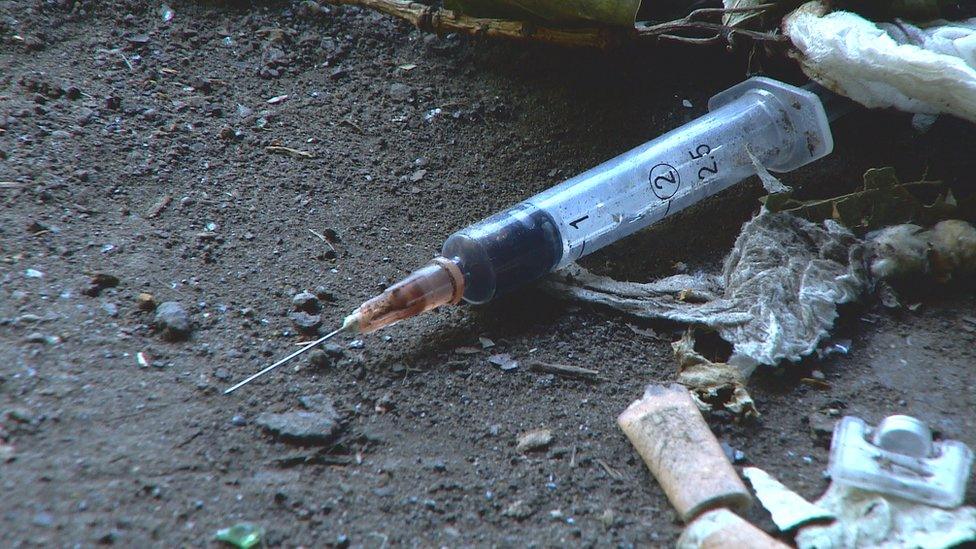Mental illness and trauma blamed for rising drug deaths
- Published

The level of drug-related deaths in Scotland is 2.5 times that of other countries in the UK
High levels of drug misuse in Scotland have been linked to mental illness or childhood trauma, MPs investigating the problem have been told.
It comes as figures showed drug-related deaths in Scotland are now 2.5 times that of other UK countries.
The total for 2018 is expected to top 1,000 for the first time.
The Commons Scottish Affairs Committee (SAC) will begin an inquiry on Tuesday to see why the numbers are so high and what the Scottish Parliament can do.
Drug legislation is currently reserved to Westminster.
'Felt more keenly'
Written evidence already submitted to the inquiry team from drugs charities and health boards has highlighted links between mental health ill health and problem drug use, and reveals how stressful and traumatic experiences in childhood can increase the likelihood of a person developing problematic drug use later in life.
Pete Wishart, who will chair committee, said: "As we start our inquiry into problem drug use in Scotland it's important that we understand why some people are more likely to engage in drugs use, so support can be targeted to people at greater risk.
"The written evidence my committee has received reveals that there are many complex factors that can lead an individual to problematic drug use, and some of these influences are felt more keenly in Scotland than elsewhere in the UK."

Committee chair Pete Wishart says there are many complex factors leading to problem drug use
Scotland has a disproportionately high number of problem drug users, estimated at more than 62,000.
Drug-related deaths have increased from 224 in 1997 to 934 in 2017, and are expected to top 1,000 for 2018.
The committee was told about links between mental health conditions and problematic drug use, particularly in rural areas.
'Insular nature'
NHS Shetland said poor mental health had been identified as a key driver for substance misuse, by way of self-medication and that until recently the islands had a consistently high suicide rate.
It told the MPs: " Personal and social experiences often occur together and lead to poorer outcomes overall for people's health and wellbeing.
"From an island perspective, the sometimes insular nature of small communities can amplify these experiences."

In a joint submission the alcohol and drug partnerships from Angus and Perth and Kinross said 74% of those who died from drug-related causes in Tayside in 2017 were known to have an existing mental health condition, most commonly depression or anxiety.
The effect of adverse childhood experiences (ACEs), such as domestic violence, physical, sexual or psychological abuse, or exposure to parental substance abuse was also highlighted in some of the evidence presented to the committee.
Make money
The committee said while adverse childhood experiences are also a driver of problem drug use elsewhere in the UK, Scotland has a far higher prevalence of social issues which lend themselves to adverse childhood experiences, such as children being removed from parental care and being raised in state care.
Poverty was also raised as a driver of problem drug use.
The charity Crew 2000 said young people experiencing poverty and deprivation were more likely to start drug taking earlier than their better-off peers, take drugs in a more dangerous way and live where dealing drugs may be seen as a way to make money.
In its first evidence session Tuesday, the committee will hear calls from academic experts on the effectiveness of drug decriminalisation, the relationship between benefits policy and problem drug use, and the UK government's decision to block the opening of a supervised drug consumption facility in Glasgow.